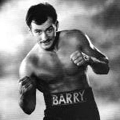 Loading... Please wait...
Loading... Please wait...Categories
Our Newsletter
You Recently Viewed...
Profile
Division: Bantamweight/Featherweight Major Titles: All Ireland Amateur Champion (1976)Commonwealth Champion (1978)British Featherweight Champion (1983)European Champion (1983)WBA Featherweight Champion (1985) Fight Record: Won 32 (28 inside), Lost 3, Drawn 0 Born: 28th February, 1961 Hometown: Clones, Co. Monaghan, Republic of Ireland Career Highlights: 1976 - Defeated Martin Brereton to win the All Ireland Amateur Bantamweight Championship1978 - Commonwealth Games Bantamweight ChampionApril 1983 - Defeated Vernon Penprase (2nd round, TKO) to win the British Featherweight titleNovember 1983 - Became European Featherweight Champion after defeating Valerio Nati (6th round, KO)June 1984 - Successfully defended European title against Esteban Eguia (3rd round, TKO)December 1984 - Sucessfully defended his European and British titles after defeating Clyde Ruan (4th round, KO)June 1985 - Became World Boxing Association (WBA) Champion after defeating Eusebio Pedroza (points victory after 15 rounds)September 1985 - Sucessfully defended his WBA title by defeating Bernard Taylor (9th round, retirement)February 1986 - Defended his WBA title again, defeating Danilo Cabrera (14th round, TKO)June 1986 - Lost his WBA title to Steve Cruz in 129 degree heat of Las Vegas (points loss after 15 rounds)Inactive in 1987, he returned to the ring in April 1988.
He had four fights losing his last fight against Jim McDonnell in 4 roundsHe was only defeated three times in his professional career, against Steve Cruz, Jim McDonnell and Peter Eubanks (points loss after eight rounds in his third pro fight). He defeated Peter Eubanks in the return fight. Barry McGuigan For some reason very few Irish fighters have ever been blessed with the "luck of the Irish". The Emerald Isle's best example of this problem is surely Barry McGuigan, The Clones Cyclone. In the early 1980's, interest in Boxing in the U.K. and Ireland was rapidly dwindling due to a number of things. Muhammad Ali had retired, the new generation of U.S. stars, the Sugar Ray Leonards, the Haglers and Hearns aroused sparse interest among the general public. The tragic ring death of Welsh bantamweight Johnny Owen in September of 1980 had been a tremendous blow to Boxing and not for the first time, the sport was in danger of being disregarded by society. Northern Ireland in the early 80's obviously had problems of it's own.
The region was going through some of it's darkest days but a young fighter from the border town of Clones, in County Monaghan was about to bring some much needed life and vitality into the North and generate an excitement in boxing circles that had not been seen for some time. Barry McGuigan was born in 1961, his father, Pat had represented Ireland in the Eurovision Song Contest and his pre-fight renditions of Danny Boy would become legendary. Barry showed great potential as an amateur and represented Ireland in the 1980 Olympics. However his greatest moment as an amateur came two years before the Olympics when he won Gold at the Commonwealth Games in Edmonton. In 1981 he made the inevitable decision to turn professional. After receiving many offers McGuigan chose Belfast bookmaker, Barney Eastwood as manager. McGuigan suffered a setback in his third pro fight when he was out pointed by Peter Eubanks, then in June 1982 tragedy struck when Young Ali, a Nigerian opponent that McGuigan had knocked out in 6 rounds died from brain injuries received in the bout. McGuigan thought long and hard about his future in the sport but eventually he decided to continue boxing in the hope of winning a world title and dedicating it to Young Ali. In April 1983 he relieved Vernon Penprase of his British title and later that year he knocked out the Italian, Valerio Nati to claim the European title at featherweight. At this stage McGuigan was already generating much excitement among the public, with his charm and ready smile he became an immediate favourite and his crowd pleasing style gained McGuigan a large army of supporters from both sides of the religious and political divide in Northern Ireland.
A relentless pressure fighter who was a master of the forgotten act of body punching, McGuigan's style was reminiscent of some of the great Mexican fighters of earlier eras. All important stateside television coverage soon turned McGuigan into a hot property in the US and after his mightily impressive win over ex world champ Juan La Porte the dream of a world title fight was realised. The opponent was to be long reigning WBA featherweight king, Eusebio Pedroza, the venue Loftus Road, an outdoor football stadium in London. On the 8th of June 1985 in front of a partisan crowd of over 27,000, Barry McGuigan achieved his lifetime ambition by being simply too young, too sharp and too much for the ageing champion, Pedroza. On a remarkable, emotion filled night, McGuigan floored the durable veteran in the 7th round and went on to record a comfortable points victory. Afterwards McGuigan remembered Young Ali and dedicated his new title to Ali's memory. The McGuigan reign had begun but it was to be much shorter than anticipated. McGuigan's career had reached its highest point, civic receptions were held in his honour in Dublin, Belfast and his native Clones. The whole of Ireland united in support for their newest hero. McGuigan's first defence was held in September of 1985 in the atmospheric King's Hall in Belfast against the American Bernard Taylor, a quick and stylish boxer. For the first few rounds McGuigan had problems figuring out Taylor's style, but his incessant body punching proved too much for Taylor and he quit at the end of the eight round after taking what McGuigan later described as the best body punch he ever threw. With his mandatory defence out of the way McGuigan should have been looking forward to some lucrative voluntary defences, however behind the scenes his relationship with manager Barney Eastwood was coming under increasing strain. Eastwood had no previous experience of managing a world champion and he now found himself having to negotiate with savvy and experienced boxing promoters like Mickey Duff and Bob Arum. This inexperience led to a breakdown in communications between McGuigan and Eastwood. In February of 1986, McGuigan defended his title in Dublin against a late sub, Danilo Cabrera.
McGuigan eventually caught up with Cabrera in the 14th round in a performance that received much criticism in the media. However McGuigan was now looking forward to dropping down a weight to junior featherweight to challenge the WBA champion Wilfredo Gomez, Eastwood though had other ideas and wanted McGuigan to appear on a Las Vegas bill in the summer. Shortly after the Cabrera fight Eastwood announced a McGuigan defence for Caesars Palace, Las Vegas in June. It was not the fight that McGuigan wanted and he struggled to motivate himself for it By the time McGuigan had arrived in America for the fight, his relationship with his management and corner was disintegrating and the opponent was constantly changing. McGuigan could not acclimatise to the heat of the Nevada summer and after injuring his ankle it seemed the fight was off. However Eastwood insisted that the latest opponent, Steve Cruz a Texan with an average record, would provident threat to McGuigans title. On the 23rd of June 1986, Barry McGuigan lost his title and almost his life in a temporary arena set up in the car park of Caesars Palace. In temperatures, which topped 125 degrees, the Clones Cyclone never stood a chance and after a brave struggle over 15 rounds, McGuigan lost narrowly on points. A delirious McGuigan was rushed to hospital suffering from dehydration. McGuigan's world championship career was over. It would be almost two years before McGuigan would fight again. The year after losing his title was filled with costly and acrimonious legal battles with Eastwood and then tragedy struck with the death of his father in June of 1987, one year after his defeat in the searing heat of Vegas.
In April of 1988 McGuigan returned to the ring under the management of Frank Warren. After 3 high profile comeback victories of varying degrees of success, McGuigan was pitted against Jim McDonnell a competent if unremarkable British fighter. McGuigan was cut badly in the second round and the fight was stopped because of the gash in the following round. McGuigan had no hesitation in announcing his retirement immediately after the fight and his record stands at 35 fights, 32 wins and 3 defeats, a good if unremarkable record for a remarkable fighter. More legal battles with Eastwood were to follow which hit McGuigan heavily in the pocket. He resisted many comeback offers, preferring to stay true to his word and begin work on a union for boxers. McGuigan achieved this ambition, although the Professional Boxers Association does not enjoy as high a profile as McGuigan might like it has been more effective than is perceived in the media, especially in the area of education and boxer's safety. For McGuigan the 1990's have brought some heartbreaking personal tragedies, but through it all he remains the fighter with the ready smile and quick wit. His face remains familiar to the public in his role as resident boxing expert with Sky Sports and over the years McGuigan has displayed his perceptiveness and intelligence in discussing the sport. McGuigan was by quite some way the most charismatic boxer of his generation to emerge from the UK and Ireland, capturing the public’s imagination like no one else.
However his reign was much shorter than his talents deserved and he missed out on a career defining rivalry. Having said this McGuigan remains one of the most explosive and exciting fighters of the last 20 years and one that all Ireland can be proud of.

